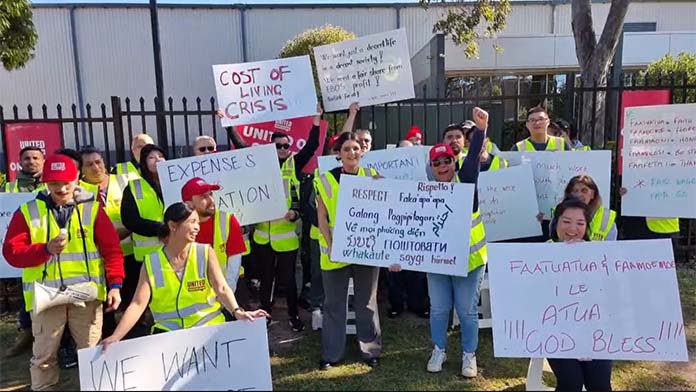About 50 workers at hospital and health care supplier Onelink in western Sydney took four days of strike action this week for wage rises to keep pace with the cost of living and higher redundancy payments.
The workers, members of the United Workers Union, package and distribute goods sent to hospitals including gloves, toilet paper and masks under a contract with NSW Health.
Many of the workers are women, from a range of backgrounds including Maori, Pacific Islander, Asian and South Asian.
Onelink is a subsidiary of the EBOS Group, which owns a number of healthcare wholesale companies as well as pharmacy chains including Terry White pharmacies.
Workers are fighting for the same pay as other sites run by the company. One worker told Solidarity, “The difference [in pay] between us and the other companies from the group is between $4 and $7 an hour.” This includes another nearby EBOS site run by subsidiary Symbion. “We just want to be paid the same,” he said.
Meanwhile, CEO John Cullity was paid $1.4 million and the total company profit increased almost 10 per cent to $202 million last year.
During the pandemic Onelink was an essential supplier for local hospitals. Another worker said, “It was crazy through COVID, long hours, a lot of the workers putting themselves at risk when other people got to stay home.” Yet with inflation at 7 per cent the company is refusing even to offer its workers a pay rise that keeps pace with the cost of living.
They are demanding a wage rise of 7 per cent this year, followed by 5 per cent and 3 per cent the third year. The company has offered 4 per cent the first year then 3 per cent a year. Workers also want a redundancy agreement that matches that at Symbion of 52 weeks’ pay.
Workers from a nearby Symbion warehouse have visited the picketline to show their support, with a worker from Symbion saying the strike was part of the same struggle across the company, “fighting for our families, fairness and wages”.
A number of casuals and agency workers are breaking the strike to continue to operate the warehouse.
The company is also spending thousands on private security to protect scab labour—money that could be spent on workers’ wages.
According to workers at Onelink “they can’t do the work without us” since the agency workers don’t know how to run the warehouse and have been making frequent mistakes putting together packages.
But allowing the warehouse to keep operating allows the company to drag out the dispute and try to grind the strikers down. Hard pickets that stopped scab workers entering the workplace could force the company to give in quickly. This would mean defying court orders and the anti-strike laws.
The strike is scheduled to resume again on Tuesday.
The workers are militant, united and willing to fight it out. As one worker put it, “We’re solid, we’ll be 100 per cent until the end.”
Stepping up the strike through hard pickets to shut down the warehouse completely is the way to win.
By Jayden Awarau






